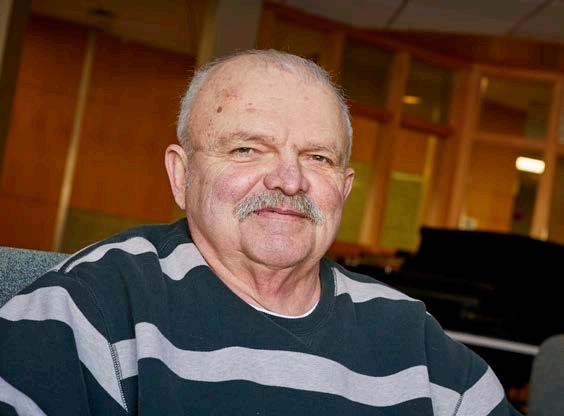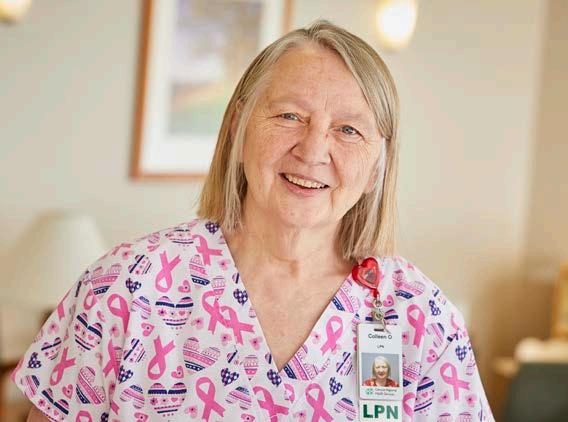
2 minute read
BOB
growths or polyps,” says general surgeon Chad Robbins, DO, FACOS.
In Bob’s case, colonoscopies had yielded only benign growths until 2014, when Dr. Robbins removed three small pre-cancerous polyps. He also found a large flat mass that couldn’t be removed with the colonoscope. He took a tissue sample, which showed the mass had cancerous potential.
Options Explored
At Dr. Robbins’ suggestion, Bob consulted a cancer specialist about the best way to remove the mass. Together they decided it was best for Dr. Robbins to perform surgery.
Know your screening GUIDELINES
Your health care provider will talk with you about recommended preventive health screenings, but they are easy to find online.
Retiree Bob McKimm walks the talk about a healthy lifestyle. When knee pain at age 30 changed him from a runner to a walker, he kept up his mileage by heading out two or three times a day! He’s just as serious about getting preventive health screenings. He started regular colonoscopies at age 50, even though he had no family history of colorectal cancer.
“Colonoscopy allows us to detect cancer at a treatable stage and actually prevent a colorectal cancer from starting by removing pre-cancerous
Dr. Robbins removed the mass, as well as 10 inches of Bob’s colon. Once removed, the mass tested positive for early-stage colon cancer.
Appreciates His Good Fortune
Bob tells anyone who’ll listen not to avoid having a colonoscopy because it’s a bit uncomfortable. “It’s probably human nature to want to avoid it,” he says, “but it’s necessary. You don’t do it to have fun. It’s about prevention.
“Just because no one in your family has had cancer doesn’t mean it won’t happen to you.” taken by surprise in 2011 when her scan indicated a possible cancerous mass. Because she’d had regular scans, no family history of breast cancer, and dense breast tissue that normally feels lumpy, she didn’t believe the preliminary diagnosis until a biopsy two weeks later confirmed it was cancer.
Cancer Spread Rapidly
A 37-year employee of GRHS, nurse Colleen Otto, LPN, often wears a pink ribbon-themed top while working at the Lester Prairie Clinic. Her interest in promoting mammograms is more than professional – it’s personal.

When she found a lump in her breast 17 years ago, Colleen immediately scheduled a mammogram, which was followed by an ultrasound. Fortunately, these tests showed the lump was not cancerous. It was fibrocystic tissue, which is a common, benign condition that can cause breasts to feel lumpy.
After that experience, Colleen scheduled a screening mammogram like clockwork every year. She was
The biopsy showed her cancer had been detected early, at stage 1. However, by the time Colleen had lumpectomy surgery 31 days later, it was stage 3. The cancer had rapidly spread to seven of the 16 lymph nodes that were removed and tested. As a result, Colleen needed both chemotherapy (16 sessions, scheduled every other week) and radiation therapy (33 sessions).
To the amazement of everyone at the clinic, Colleen never missed a day of work. She credits that feat to strong faith and supportive coworkers. Colleen scheduled chemo every other Friday, became “sicker than a dog” the following Sunday, but felt good enough to work on Monday.
TAKE THE OUNCE, NOT THE POUND
Whenever a patient tells Colleen she’d rather not have a mammogram to avoid the test’s brief discomforts, Colleen replies that it feels much worse to have chemo and radiation therapy.
GRHS follows guidelines recommended by the U.S. Preventive Services Task Force. The Centers for Disease Control and Prevention (CDC) supports the task force’s screening guidelines for breast, cervical, colorectal (colon), and lung cancers.
A summary can be found here: cdc.gov/cancer/dcpc/prevention/screening.htm
Dr. Robbins recommends the American Cancer Society’s breast cancer screening guidelines: cancer.org/cancer/breast-cancer/screeningtests-and-early-detection
“I’m a private person,” Colleen says, “but when it comes to cancer, I’m a speaker because I don’t want anyone else to go through what I did.”
RISE & SHINE, it’s mammogram time!
To serve you better, we’ve expanded our business hours for screening mammograms.
Appointments are available beginning at 6:15 am Monday through Friday. We also perform the exam until 6:30 pm on select days each month.
To schedule, call 320-864-7080 or toll free 1-888-526-4242, ext. 7080
For information on options and what to expect, visit grhsonline.org/mammograms





